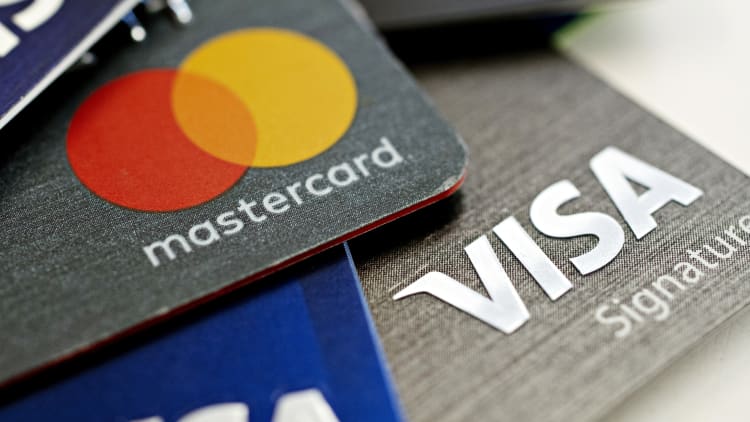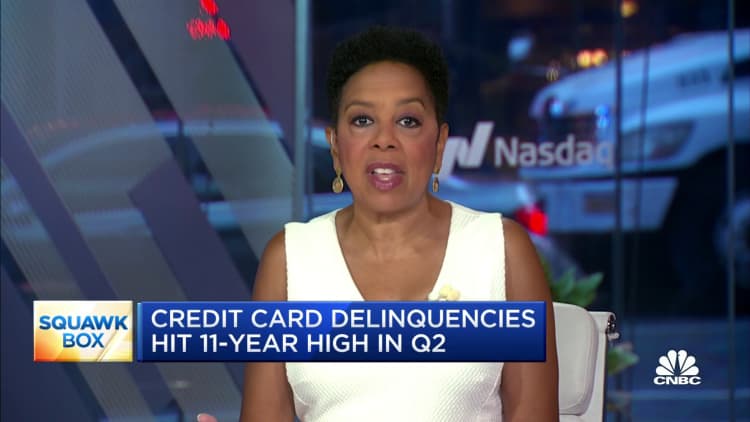Luis Alvarez | Digitalvision | Getty Images
Some lawmakers and regulators are calling for interest rate caps and lower fees on credit cards as debt levels march higher.
Total credit card debt topped $1 trillion in the second quarter of 2023 for the first time ever.
The average interest rate for all cardholders jumped to more than 21% in August, the highest on record, according to Federal Reserve data. Some cards — retail store cards, in particular — charge more than 30%, said Ted Rossman, industry analyst for CreditCards.com.
More from Personal Finance:
New Labor Department rules will likely target rollovers to IRAs
What strikers need to know about unemployment benefits
77-year-old widow lost $661,000 in a common tech scam
Sen. Josh Hawley, R-Mo., introduced a bill in September to cap credit card rates — also known as the annual percentage rate, or APR — at 18%, citing “higher financial burdens” shouldered by working people.
The legislation, the Capping Credit Card Interest Rates Act, would also aim to prevent card companies from raising other fees to evade a cap.
Meanwhile, the Consumer Financial Protection Bureau proposed a rule earlier this year to slash fees for late credit card payments. One prong of the rule would lower fees for a missed payment to $8 from as much as $41.
In June, four senators — Sens. Richard Durbin, D-Ill.; Roger Marshall, R-Kan.; J.D. Vance, R-Ohio; and Peter Welch, D-Vt. — introduced the Credit Card Competition Act. That act aims to reduce merchant card transaction fees that may get passed on to consumers.

“I think some of the [political] lines are starting to blur a little bit, at least on credit card issues,” Rossman said.
However, it’s unclear if these measures will succeed.
For example, Democrats are “likely to embrace” Hawley’s bill since progressives have long favored a federal interest rate cap, Jaret Seiberg, analyst at Cowen Washington Research Group, wrote in a recent research note. But it likely doesn’t have enough support to overcome a filibuster in the Senate and is almost a nonstarter in the Republican-controlled House, he said.
“We do not see a path forward for legislation to cap credit card interest rates,” Seiberg said.
The CFPB is also embroiled in a legal fight before the Supreme Court that, depending on the outcome, has the potential to erase all agency rulemakings from the books.
There’s virtually no federal cap on card rates
Americans have leaned more on credit cards to pay their bills as pandemic-era inflation raised prices on food, housing and other consumer items at the fastest pace in four decades.
Credit cards are the “most prevalent form of household debt,” and their use continues to spread, according to the Federal Reserve Bank of New York. There are 70 million more credit card accounts open now than in 2019, it said.
Rates have moved upward as the Federal Reserve has raised its benchmark interest rate to reduce inflation.
Credit card interest rates have predominantly remained below 36% due to “self-restraint” by banks, though that’s still “extremely high” for a credit card, said Lauren Saunders, associate director at the National Consumer Law Center.
However, current federal law generally doesn’t impose a ceiling on rates, she said.
I think some of the [political] lines are starting to blur a little bit, at least on credit card issues.
Ted Rossman
industry analyst for CreditCards.com
There are some exceptions: The Military Lending Act caps interest for active duty servicemembers and dependents at 36% for consumer credit. Federally chartered credit unions have an 18% limit.
Past legislative proposals have also sought to slash interest rates. For example, Sen. Bernie Sanders, I-Vt., and Rep. Alexandria Ocasio-Cortez, D-N.Y., introduced a measure in 2019 that would have capped rates at 15%.
Reps. Jesús “Chuy” García, D-Ill., and Glenn Grothman, R-Wis., proposed a 36% cap on consumer loans in 2021. Grothman plans to reintroduce the legislation next year, his office said.
“The 36% interest rate cap for active-duty servicemembers and their families has proven to be a highly effective measure in providing protection against predatory lending practices,” Grothman said in an email. “Why should we not extend these same protections to veterans and all Americans?”
The financial services industry remains largely opposed to imposing a ceiling.
Eight trade groups representing lenders such as banks and credit unions wrote a letter to Sen. Hawley in September, stating that his proposed cap would have adverse effects including restricting the availability of credit and eliminating or reducing popular card features such as cash back rewards.
Interest income accounts for 80% of company profits on credit cards, according to a 2022 study published by the Federal Reserve.
How to reduce your personal card rate to 0%
Rossman’s general advice to consumers: Make your personal credit card rate 0%.
That means paying your bill in full and on time each month. Such customers don’t get charged interest, while those who carry a balance from month to month generally accrue interest charges.
That advice wouldn’t change, even if the rate were capped at 15% or 18%, for example, he said.
“[Such rates] would be better, but no picnic in my estimation,” Rossman said.

The average credit card balance is almost $6,000, according to TransUnion.
At 18% interest, cardholders with an average balance who make only the minimum monthly payment would be in debt for 206 months and make $7,575 in total interest expenses, according to Rossman. The latter figure doesn’t include payments toward principal.
“Minimum-payment math is brutal,” he said. “Your debt can drag on for decades.”
Join CNBC’s Financial Advisor Summit on Oct. 12, where we’ll talk with top advisors, investors, market experts, technologists and economists about what advisors can do now to position their clients for the best possible outcomes as we head into the last quarter of 2023 and face the unknown in 2024. Learn more and get your ticket today.

